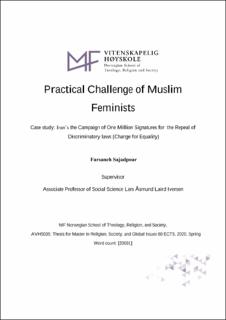| dc.description.abstract | he purpose of this thesis is to further understand the practical challenges Muslim feminists face in Iran and how they deal with the challenges in the political field of Iran. This qualitative research project is a case study of the Campaign of One Million Signatures for the Repeal of Discriminatory Laws (OMSCE). The aim of the campaign and the two rallies leading up to it was to petition for changing the inequality law against Iranian women in the Constitution. A focus on discourse and themes that emerged were applied to analyze published statements from the first rally in 2005, second rally in 2006 and finally the Campaign itself. I propose that Muslim feminists have reproduced the social structures over the years based on their relationship to the power's ideology. To examine this, I used the theoretical framework applying Pierre Bourdieu’s Theory of Power and Practice and Michel de Certeau’s theory of The Practice of Everyday Life. Thematic analysis method to answer the following questions:
1- What tactics do the women of the OMSCE apply to escape power?
2- To what extent do these tactics indicate power relations in social structure and everyday practice?
3- What does OMSCE see as the strategies of domination to regulate and control feminist Muslims?
The findings show that the political field of Iran does not provide opportunities for Muslim feminists to insist on their demands for changing the discriminatory laws. Iranian Muslim feminists revealed an inconstancy on their demands during the time of the rallies and campaign to enable them to remain in the political field. Regardless of the tactic adopted by the Muslim feminists, the nature of political Islam does not tolerate any opponent even if their objections are situated within Islamic discourse. The campaigners adopted different tactics in everyday life to overcome the government's strategies. Although they succeeded at some points, such as facilitating acts of solidarity or training women in grassroots tactics, overall, they did not reach their goals to collect one million signatures to repeal discriminatory laws in Iran’s constitution. | en_US |
